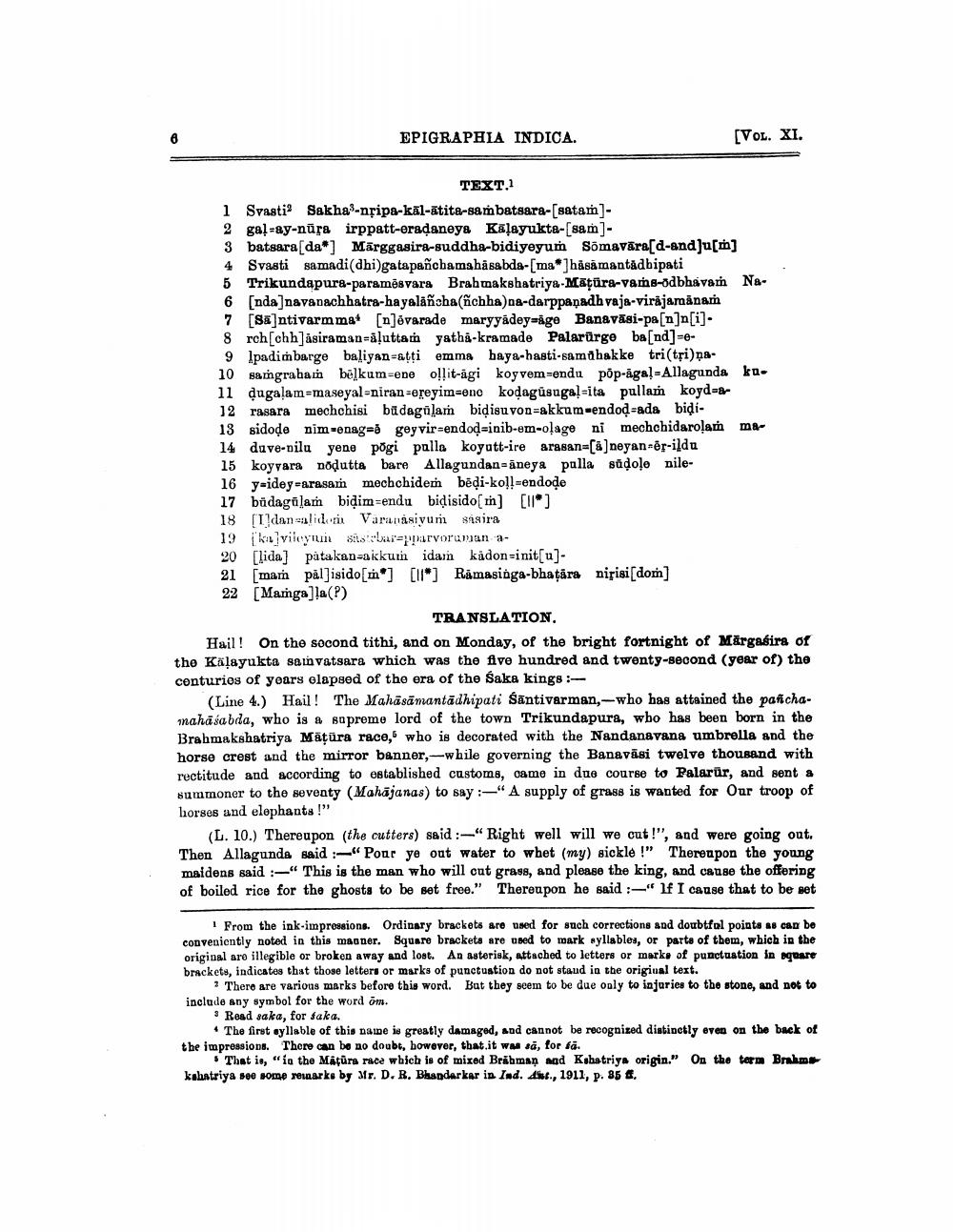________________
EPIGRAPHIA INDICA.
[VOL. XI.
TEXT. 1 Svasti? Sakhal-nfipa-kāl-atita-sambatsara-(sataṁ)2 gal-ay-nūra irppatt-eradaneya Kalayukta-sam]3 batsarada] Mārggasira-suddha-bidiyeyum Sõmavāra[d-and Ju[m] 4 Svasti samadi(dhi)gatapañcbamshásabda-[ma]håsamantadbipati 5 Trikundapura-paramosvara Brahmakshatriya-Maţüra-vams-odbhavam Na6 [nda)navanachhatra-hayalañchanchha)na-darppanadh vaja-virajamanam 7 [SK]ntivarmma. [n]ávarade maryyadey=åge Banavisi-pa[n]n[i]. 8 roh[chhJäsiramanmaļuttam yatha-kramade Palarürge ba[nd] =9 Ipadim barge baliyan=atti emma baya-hasti-sama hakke tri(tri)ņa10 samgrabai bē]kum=ene ollit-agi koyvem-endu pop-agal-Allagunda ka. 11 dugalam-maseyal-niran-ereyim-ene kodagūsuga!=ita pullam koyd12 rasara mechchisi būdagūlam bidisu von=akkum-endod-ada bidi13 sidode nim-enag=b gey vir-endod-inib-em-olage ni mechchidarolam me14 duve-nilu yene pogi palla koyatt-ire araban-[&]neyanner-ildu 15 koyvara nodutta bare Allagundan-aneya palla südolo nile16 y-ideg-arasam mechchidem bēļi-koll-endode 17 bädagülar biļim-endu bidisido in [ll] 18 [1!danalid Varanasivum sisira 19 kuviieyrun bir parvoraman a. 20 [lida) påtakan-akkum idam kidon-init(u)21 [mar päl]isido [m] [ll] Rāmasinga-bhatāra nirisi[dom) 22 [Manga]la (P)
TRANSLATION. Hail! On the socond tithi, and on Monday, of the bright fortnight of Märgasira of the Kalayukta sain vatsara which was the five hundred and twenty-second (year of) the conturios of yours elapsed of the era of the Saka kings :
(Line 4.) Hail! The Mahāsämantādhipati śāntivarman,-who has attained the paschamahāśabda, who is a supreme lord of the town Trikundapura, wbo has been born in the Brahmakshatriya Matura race, who is decorated with the Nandanavana umbrella and the horse crest and the mirror banner,-while governing the Banavāsi twelve thousand with rectitude and according to established customs, came in due course to Palarür, and sent a summoner to the seventy (Mahājanas) to say "A supply of grass is wanted for Our troop of horses and elephants !"
(L. 10.) Thereupon (the cutters) said :-"Right well will we out!", and were going out. Then Allagunda said :-"Pour ye out water to whet (my) sickle!" Thereupon the young maidens said :-" This is the man who will cut grass, and please the king, and cause the offering of boiled rice for the ghosts to be set free." Thereupon he said :-"If I cause that to be set
I From the ink-impressions. Ordinary brackets are used for such corrections and doubtful points as can be conveniently noted in this manner. Square brackets are used to mark syllables, or parts of them, which in the original are illegible or broken away and lost. An asterisk, attached to lettore or marke of punctuation in soare brackets, indicates that those letters or marks of punctuation do not staud in the origiual text.
There are various marks before this word. Bat they seem to be due only to injuries to the stone, and not to include any symbol for the word om.
* Read saka, for faka.
The first syllable of this name is greatly damaged, and cannot be recognized distinctly even on the back of the impressions. There can be no doubt, bowever, that it was sā, for fa.
. That is, "ia the Mâţurs race which is of mixed Brāhmaṇ aad Kshatriya origin." On the term Brahms kahatriya see some researks by Mr. D. R. Bhandarkar in Ind. diss., 1911, p. 85 &.




